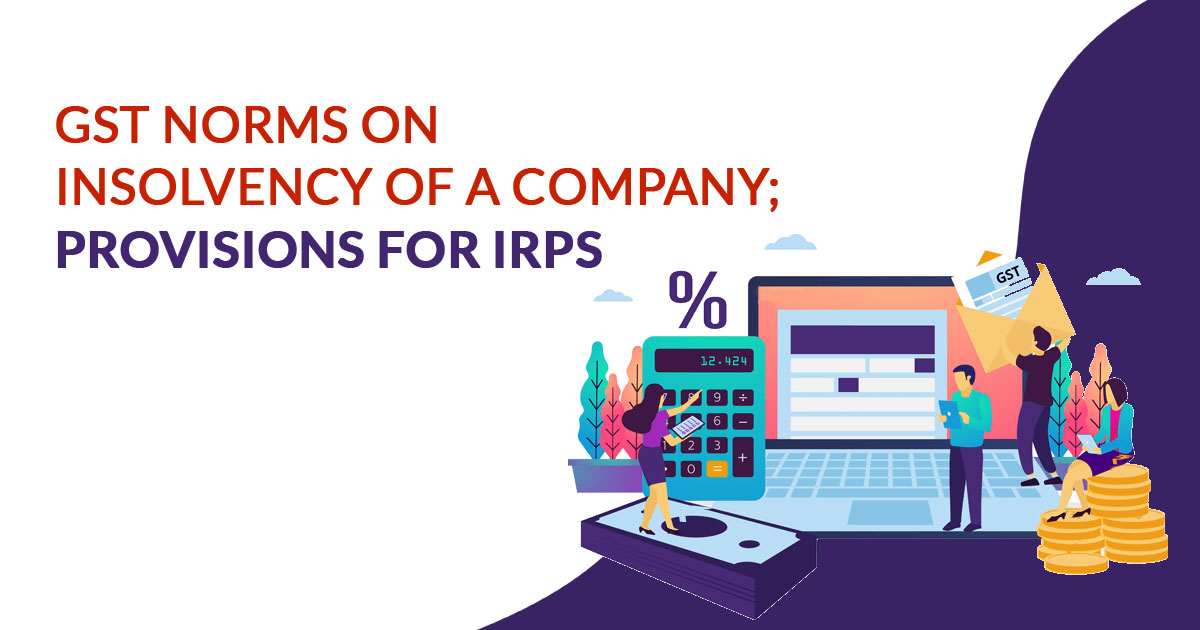
A company is announced insolvent when it has no caliber left to continue with its business and that it is the end of its existence. An insolvent firm is left with no money to repay the loans. Nobody has control over issues like insolvency. A company might go insolvent due to the ever changing market, due to customers switching their priorities or any other reason.
Talking about the resolution of insolvency it is the process where the professional works on how the insolvent company will repay its loans. Earlier it was difficult for creditors and banks to recover the loans until the Insolvency and Bankruptcy Code (IBC) came in 2016.
According to the code for old companies, 180 days are allotted to resolve the loans and could be extended upto 90 days more i.e. total of 330 days (legal proceedings included). For startups, the timeline allotted is 90 days that can be stretched till another 45 days.
Talking about tax payments, there is a specific section in the CGST Act 2017 which states that as per the laws prevalent in any other act or otherwise given by IBS, any amount that remains to be received from such taxable person (tax, interest or penalty), the government will be the first in charge to the property of such taxable person.
Liquidation for companies is a stage where a company is shutting down and is liable to pay the debts through assets. If the company has GST dues then the GST department shall be considered like other claimants (creditors).
The doubt still prevails on the below-mentioned queries, the company while going under liquidation,
- Is it liable to pay the taxes on the new supplies done by them?
- Are eligible to claim input tax on their inward supplies?
- Is liable to file the returns if they had not paid the taxes?
- What should be done if it has pending cases to be filed and tax payments to be made?
- Are the assets sold in auction inviting any tax levy?

All the above-stated queries were also subjected to discussions in the current 39th GST Council Meeting. Paying heed to the conclusions driven from the Council meeting, CBIC has issued the following circulars:
>Notification No. 11/2020 – Central Tax Dated 21st March 2020
>Circular No.134/04/2020-GST dated 23rd March 2020
Clarity has been Provided in the following cases:
- GST Registration of the IRP/RP – If a professional is being appointed as an IRP/RP for the insolvent company then they need to acquire a different GST registration Number. The existing GST Registration of the Debtor is not valid.
- Time taken for the new registration – The IRP/RP appointed for the resolution of an insolvent company needs to get the new GST registration number within 30 days starting from the date of his/her appointment.
- IRP/RPs appointed before the notification – The already existing IRPs/RPs (who were appointed before the notification) shall proceed with the formalities for acquiring the new GST registration number (the number is needed within 30 days from the date of information).
- PAN Number – Through the GST Number of the Corporate Debtor will be new that needs to be acquired on the basis of the same PAN as proof. IRP/RP is required to get the GST registration number as a distinct person. A distinct person is the one who acquires the different GST Registration but with the same PAN as proof.
- The existing GST Registration – The ongoing registration number of the company or Corporate Debtor will remain active provided that the company has applied for cancellation of the number. If the application of cancellation has been filed within that period then the registration officer has to keep the application on ‘Suspension’ status.
- For canceled GST registration – If the registration of the corporate debtor has already been canceled, the IRP/RP should apply for the revocation of the number if there is enough time.
- Return Filing – IRP/RP needs not to file the returns of the debtors for their pre-CIPR period for which returns have not been filed.
- Recovery Proceedings – GST department is no way allowed to carry forward their recovery proceedings under the resolution process. Under section 14 of IBC 2016.
- Recovery of tax by GST department – The tax dues that are to be paid by the corporate debtor will be considered as operational debt (as per the norms of IBC) for which Form B has to be filed.
- Multiple GST Registrations – If a corporate debtor has multiple GST registration (in several state provinces) then they are required to file a single claim for each state.
- Obtaining registration as a distinct person – IRP/RP has to file the returns as a regular taxpayer on a timely basis until the resolution process of the company is over.
- ITC Availment – Input Tax Credit can be availed on supplier invoices having GSTIN of the corporate debtor.
- Norms Applicability – All the provisions of the Input Tax Credit will be applicable to the IRP/RP who have obtained registration as a distinct person on behalf of the corporate debtor. Section 16(4) of the CGST Act 2017 and Rule 36(4) is applicable to availing Input Tax Credit (ITC). but not more than 110% of the GSTR 2A.
- ITC availment based on the invoice issued by Corporate Debtor – The invoices issued by the Corporate Debtor starting from the date of appointment of IRP/RP or within 30 days from the issue of Notification No 11/2020, Central Tax dated 21st March 2020.
- Claiming refunds from Cash Ledger – If IRP/RP has deposited cash in the cash ledger of the company it can be claimed by the corporate debtor.
READ ALSO : Government’s Lockdown Rules for Workplaces
More Clarifications are sought related to the Provisions of IBC 2016:
a). When the resolution process is over, and the amount of GST liability is recovered with a haircut, in such cases, is it required to file the GST Returns? If yes, how to show the amount of haircut in the returns? Or it has to be canceled or surrendered?
b). Is it needed by the corporate debtor to file the final returns on the date of CIRP?
c). How will the input tax credit in the input tax ledger be signified (any old credit)?
d). Is IRP/RP responsible to surrender and file the final return of the GST on behalf of the Corporate Debtor?
e). Once the CIRP is over, IRP/RPs are required to give away their registrations? How the unutilized ITC will be treated?
There are several other queries that are sought from the government related to the resolution process of the insolvent company. It is a dynamic topic that comes up with a change and needs to be resolved at that moment only. A clear understanding of the resolution process is still not possible. For an Act to gauge whether it is successful or not it requires about 3 to 5 years and in this case, both the laws, IBC and GST are new once.








